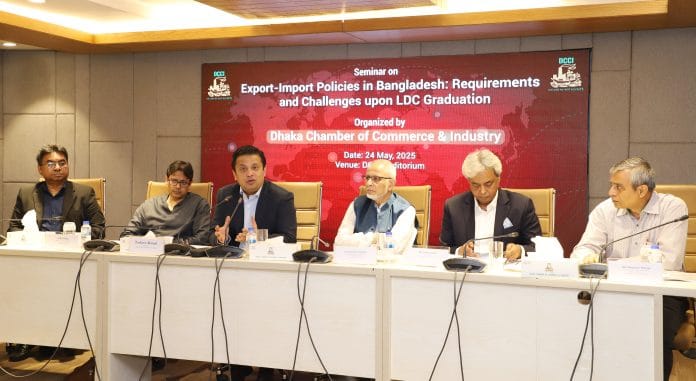Bangladesh must urgently reform its export-import policies to remain competitive in the global market after graduating from its Least Developed Country (LDC) status, speakers emphasized at a seminar organized by the Dhaka Chamber of Commerce & Industry (DCCI) on Saturday.
At the seminar titled “Export-Import Policies in Bangladesh: Requirements and Challenges upon LDC Graduation,” DCCI President Taskeen Ahmed said the country’s export sector is still heavily dependent on the ready-made garment (RMG) industry, which accounts for over 84% of export earnings. He noted that other sectors like pharmaceuticals, ICT, leather, and agro-processing are yet to reach their full potential.
Ahmed also warned that Bangladesh’s heavy reliance on imported raw materials and capital machinery makes its economy vulnerable to external shocks. Recent inflation, supply disruptions, and trade restrictions—such as India’s export ban and U.S. tariffs—have further strained the economy, he added. He urged for a predictable and business-friendly tariff structure, and comprehensive trade policy to support broader industrial growth.
Dr. Selim Raihan, Executive Director of SANEM, noted that Bangladesh’s high tariff rates, overdependence on import taxes, and limited export diversification undermine competitiveness. He called for reduced para-tariffs, streamlined customs procedures, and better coordination across trade, industrial, and fiscal policies.
Special Envoy to the Chief Adviser, Lutfey Siddiqi, highlighted the need for a clear national roadmap for trade and industry. “We lack structured plans across sectors. Institutional readiness and structural reforms are essential,” he said, urging the government to improve logistics, port operations, and overall governance to support the private sector, which he termed as the main engine of the economy.
Dr. Anisuzzaman Chowdhury from the Ministry of Finance underlined the urgency of shifting towards high-value exports such as advanced garments, pharmaceuticals, and light engineering. “Bangladesh cannot afford to backtrack post-LDC. We need to build trust and coherence across policies to accelerate our economic journey,” he said, adding that a national dialogue will soon be held with all stakeholders.
Other speakers echoed the need for faster policy reforms, automation in ports and customs, and stronger private sector involvement in trade negotiations.
Several panelists stressed the importance of moving toward high-value exports, supporting innovation, and tapping into regional and global value chains. They also highlighted the need to develop alternatives to cash incentives, which will no longer be allowed after LDC graduation.
The event concluded with a consensus that timely and strategic export-import policy reform is essential for Bangladesh’s successful transition into a competitive, resilient economy in the post-LDC era.

